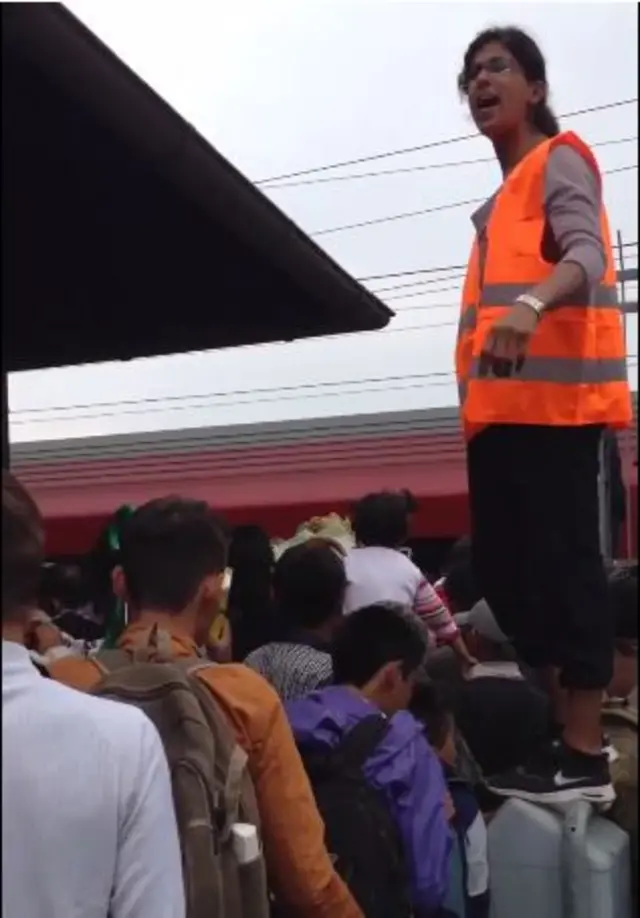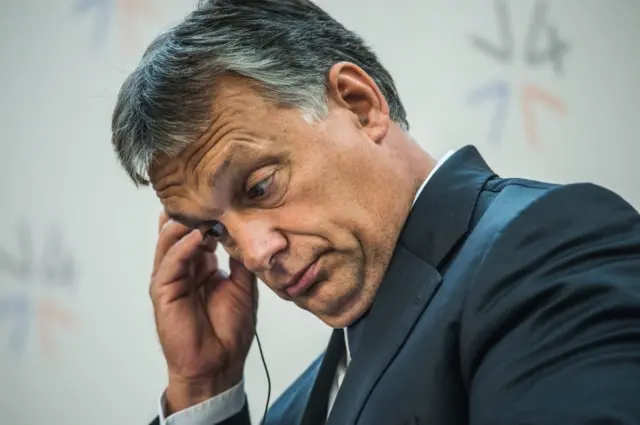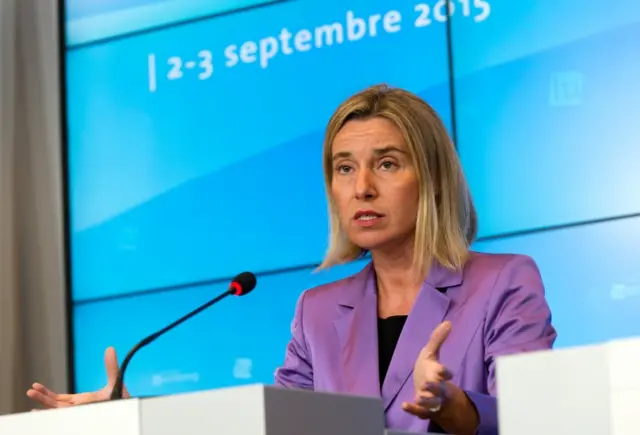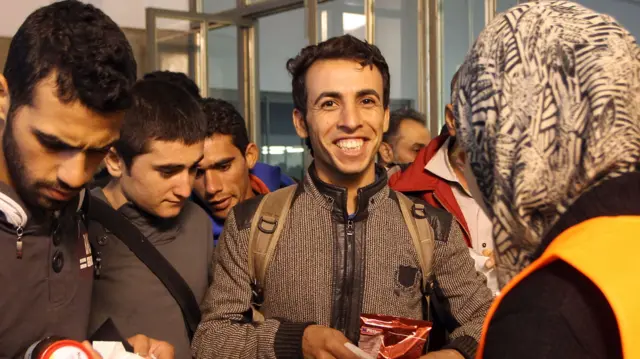Migrants gather on Austrian borderpublished at 13:32 BST 5 September 2015
A BBC foreign correspondent tweets:
Thousands of migrants crossed into Austria amid jubilation after Hungary removed restrictions on transit
Many migrants are now continuing their journey by train to Vienna
Hundreds have now arrived in Munich to be greeted by applauding crowds
Germany has promised to grant refugee status to those who fled the Syrian conflict
EU foreign affairs chief Federica Mogherini has warned that the migrant issue is "here to stay"
Jastinder Khera, Lauren Turner, Mario Cacciottolo and Alastair Lawson
A BBC foreign correspondent tweets:
Around 6,500 refugees have reached Austria since neighbouring Hungary began ferrying stranded migrants to the border, Reuters reports Interior Minister Johanna Mikl-Leitner as saying.
She added around 2,200 of them are already on their way to Germany.
BBC Radio 4's chief Today correspondent, Matthew Price, tweets this image of a train at the Austrian/Hungarian border, which has arrived to take migrants to Munich.
However, he points out that the train began its journey in Budapest, from where the migrants themselves marched or were bussed, after becoming frustrated at not being allowed to leave by the authorities. They are now being allowed to get on board, further down the line.

BBC foreign correspondent Bethany Bell tweets footage of migrants, external attempting to board a train on the Austrian/Hungarian border, in which male migrants are told to allow women and children aboard first.
Rosemary Hill emails:
"Wonderful to see the welcome and help being given in Europe - including by ordinary decent people in Hungary - to those who desperately need it. I hope (but doubt) that Viktor Orban is hanging his head in shame this morning, and likewise the leaders of the Gulf Arab countries whose silence throughout this crisis has been positively deafening. The next time they start bleating that 'the world community' should pull them out of a hole, I for one will be turning an equally deaf ear."
 Image source, EPA
Image source, EPAHungary will deploy police along its southern border after 15 September to stop an influx of refugees, Prime Minister Viktor Orban is reported as saying on Saturday by Reuters.
The PM will also send in the military if parliament approves a government proposal, the agency added. "The big changes will come after September 15... and we'll bring the border under control step by step," Mr Orban told a news conference.
"We'll send in the police, then, if we get approval from parliament, we'll deploy the military."
 Image source, AP
Image source, APIn her comments earlier to that news conference, the EU's foreign policy chief, Federica Mogherini, stressed European values. EU countries needed to cast aside their differences and stand together to deal with the problem.
"The time for blame games is over, it's time for taking decisions, turning decisions into actions, and doing it united, as Europeans.
"Only in this way will we have the possibilities to face this issue, this urgency, this dramatic event, keeping faith to our European values."
More details are coming in about the 450 migrants who arrived on a special train at Munich railway station. They will now be escorted onto a city train to take them to an emergency registration centre nearby, police say.
Police have said that authorities expect between 5,000 and 10,000 refugees to come to Germany from Hungary via Austria on Saturday.
Europe's migrant crisis has been top of the agenda at a meeting of European Union foreign ministers in Luxembourg. The EU's foreign policy chief, Federica Mogherini, said the problem was not going to disappear quickly.
"This is not an emergency - it's an urgency we are facing - but it is not something that starts that day and finishes that day.
"It is here to stay, and the sooner we accept it psychologically and politically, the sooner we will be able to respond in an effective way, and to manage in an effective way."
Hundreds of migrants have arrived in Munich station on a train from Austria, reports say.
One male migrant in the border town of Nickelsdorf told APTN he was relieved to have arrived in Austria.
"Now, it's very, very happy. Now we are free. For five days in Hungary, we were in a very, very bad position. And Allah, thanks God, thanks God."
The BBC's Imelda Flattery tweets that Hungarian police await the 1,000 or so migrants who are marching from Budapest, towards Austria.
The UN Refugee Agency has praised Austria and Germany for taking in thousands of migrants who crossed the border from Hungary. It said in a statement on Saturday that this was "political leadership based on humanitarian values".
The Geneva-based body also praised community groups and the public in Austria and Germany for helping provide a welcome to those arriving. The agency says "a remarkable outpouring of public response'' is driving some governments to change their stance on accepting migrants.
But it said "the concentration of refugees and migrants in a small number of countries willing to receive them is not a sustainable solution.''
The BBC's Berlin correspondent tweets:
Rosamund Whittam writes:
"I'm just surprised that there has been no mention of Assad on the news for days. What is he doing, how is he reacting to the many people leaving his country and why is there no political pressure on him to prevent the situation that is so dire for his own people?"
 Image source, Getty
Image source, GettyMigrants arriving in Austria from Hungary were pleased to be given food and a warm welcome.
More details on that offer from the Finnish Prime Minister Juha Sipila to make one of his homes available for migrants. It will be made available at the new year, he said.
"I know many others have made a similar decision, people either host refugees in their homes or make [other] space available.
"And I think that people ought to think what each one of us can do. People can do voluntary work, or collect funds or clothes that are needed. I hope for this kind of volunteer spirit."
Austria will not use force to stop thousands of refugees streaming into the country from Hungary, Interior Minister Johanna Mikl-Leitner is quoted by Reuters as saying.
The minister appealed to the rest of Europe to help shoulder the burden of the mass influx.
"More than 3,000 refugees reached Austria last night. Each refugee can of course apply for asylum in Austria and is being informed of this possibility," she said in a statement after a crisis task force convened in Vienna.
A BBC senior News producer tweets: